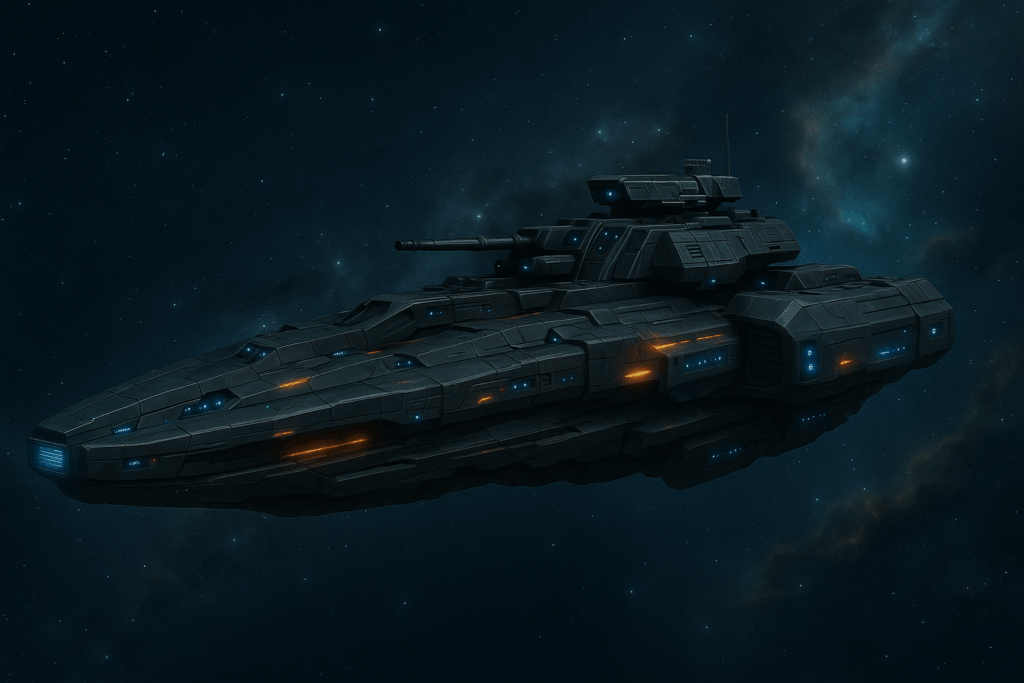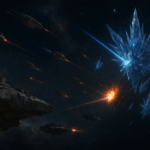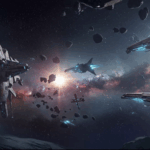The Meridian’s Edge hummed through the void like any other cargo hauler—unremarkable, ungainly, broadcasting the standard merchant frequencies that marked it as prey to those who hunted the shipping lanes. Captain Sarah Chen stood on the bridge, her weathered hands clasped behind her back, watching the sensor displays with the practiced eye of someone who had spent too many years reading the language of space.
But Sarah Chen was not what she appeared to be.
The Masquerade
The bridge around her buzzed with the controlled chaos of a merchant vessel running lean—too few crew, too much cargo, too little time. At least, that’s what any scanning pirate would conclude from the electromagnetic signatures bleeding from their hull. The reality was far more complex.
“Contact bearing two-seven-mark-four,” called out Ensign Torres from the sensor station, her voice carrying just the right note of nervous tension. “Configuration suggests raider class, possibly Zephyrian.”
Sarah’s jaw tightened imperceptibly. The Zephyrians—a species that had turned piracy into an art form, their elongated skulls housing brains that calculated profit margins with the same precision humans used for orbital mechanics. They were efficient, ruthless, and about to make a very costly mistake.
“XO Webb to the bridge,” Sarah said quietly into her comm, then louder: “All hands, this is the Captain. We have a potential pirate contact. Maintain standard merchant protocols.”
Marcus Webb arrived within moments, his graying beard and steady gait marking him as exactly what he appeared—a veteran spacer who’d seen too much of the galaxy’s darker corners. But like Sarah, appearances deceived. Webb had been her tactical advisor during the Proxima Campaign, and his mind remained as sharp as the day they’d broken the siege of New Geneva.
“How many?” Webb asked, settling beside her with the casual air of a merchant officer discussing cargo manifests.
“Single ship, but she’s big. Probably carrying a full boarding complement.” Sarah’s voice carried the weight of calculation. “Range?”
“Closing to optimal intercept in forty-seven minutes,” Torres reported.
Webb nodded slowly. “Enough time.”
The Hunters Become Hunted
Aboard the pirate vessel Void’s Embrace, Zephyr studied the tactical display with the cold satisfaction of a predator who had cornered wounded prey. The human cargo hauler was exactly what his species had come to expect from Earth’s merchant marine—slow, poorly armed, crewed by civilians who would surrender at the first show of force.
Zephyr’s elongated skull gleamed under the bridge’s harsh lighting, his four arms working the command interfaces with fluid precision. The Zephyrians had evolved on a high-gravity world where speed and coordination meant survival, and those traits had served them well in their chosen profession.
“Target analysis complete, War-Leader,” reported his tactical officer, Krix. “Standard human cargo configuration. Minimal defensive systems. Estimated crew complement: fifteen to twenty.”
“Cargo manifest?”
“Broadcasting as industrial fabrication equipment bound for the Tau Ceti colonies. High value, easily fenced.”
Zephyr’s mandibles clicked in satisfaction. Industrial equipment meant corporate insurance payouts, which meant the humans would be more interested in preserving their cargo than their lives. A clean operation—the kind that built reputations and filled coffers.
“Signal the pack,” Zephyr commanded. “Standard boarding formation. Disable their engines first, then demand surrender. If they comply, we take the cargo and leave them with life support. If not…” He let the implication hang in the recycled air.
The Dance Begins
Sarah watched the pirate ship’s approach vector with the detached interest of a chess master observing an opponent’s opening gambit. The Zephyrians were following their standard playbook—close to weapons range, disable propulsion, demand surrender. It was efficient, proven, and about to encounter something they’d never seen before.
“They’re hailing us,” reported Communications Officer Park.
“On screen.”
The main display shimmered, resolving into the angular features of a Zephyrian war-leader. Zephyr’s four eyes fixed on Sarah with the predatory focus of his species, mandibles clicking in what she recognized as anticipation.
“Human vessel, you are now property of the Crimson Fleet,” Zephyr’s translated voice carried the mechanical precision of universal translators. “Cut your engines and prepare to be boarded. Comply, and your crew will be spared.”
Sarah stepped forward, letting her shoulders slump slightly—the posture of a merchant captain facing inevitable defeat. “This is Captain Chen of the merchant vessel Meridian’s Edge. We’re carrying industrial equipment under corporate charter. Please, we have families—”
“Your families are not my concern,” Zephyr cut her off. “You have sixty seconds to comply.”
The transmission ended, leaving the bridge in tense silence. Sarah straightened, the defeated merchant captain vanishing like smoke. In her place stood the woman who had orchestrated the defense of three star systems.
“Mr. Webb, initiate Lazarus Protocol.”
“Aye, Captain. All hands, this is the XO. Lazarus Protocol is now in effect. This is not a drill.”
Throughout the ship, hidden panels slid open. Concealed weapon mounts emerged from what had appeared to be cargo containers. The Meridian’s Edge‘s true nature began to reveal itself—not a merchant hauler, but a cutting-edge military research vessel disguised as prey.
The Revelation
The transformation was breathtaking in its speed and precision. Electromagnetic dampeners that had hidden the ship’s true power signature shut down, revealing energy readings that made the pirate sensors scream warnings. Weapon systems that belonged on heavy cruisers deployed from concealed housings. Most shocking of all, the ship’s hull began to shift and reconfigure as adaptive armor plating locked into combat configuration.
“What in the void’s name—” Krix’s voice cracked as his sensors painted an impossible picture.
Zephyr’s four eyes widened as he processed the tactical display. The cargo hauler was gone, replaced by something that belonged in a military shipyard, not a merchant lane. His mandibles clicked rapidly—a sign of extreme agitation among his kind.
“War-Leader, their power signature just increased by four hundred percent! I’m reading military-grade shielding, heavy particle beam arrays, and something else—something I can’t identify.”
“Impossible,” Zephyr snarled, but his tactical mind was already calculating new probabilities. “Humans don’t have ships like this. Their military is decades behind ours.”
But the evidence blazed across his screens, undeniable and terrifying.
The Counterattack
Sarah’s voice cut through the bridge’s controlled chaos like a blade. “Target their engine compartment. Disable, don’t destroy—we need prisoners for intelligence.”
“Aye, Captain,” replied Lieutenant Commander Singh from the weapons console. “Experimental pulse cannon charged and ready.”
The pulse cannon was the reason for their mission—a prototype weapon that could selectively disable ship systems without causing catastrophic damage. It had never been tested in combat, but the Zephyrian pirates had just volunteered to be its first target.
“Fire.”
The weapon discharged with a sound like reality tearing. A lance of coherent energy, invisible to the naked eye but devastating to electronics, reached across space and caressed the pirate ship’s engine section. The effect was immediate and dramatic—the Void’s Embrace lurched as its main drive went dark, emergency lighting flickering across its hull.
“Direct hit,” Singh reported. “Their main propulsion is offline, but life support remains intact.”
Zephyr’s bridge plunged into emergency lighting as backup systems struggled to compensate for the massive system failures cascading through his ship. His tactical officer’s voice carried a note of panic that Zephyr had never heard from his crew.
“War-Leader, we’ve lost main engines, primary weapons, and navigation! Whatever they hit us with, it’s like nothing in our databases!”
For the first time in his career as a pirate, Zephyr felt the cold touch of genuine fear. Humans were supposed to be easy prey—technologically inferior, politically fragmented, militarily weak. This ship represented something new, something that challenged everything his species thought they knew about their former victims.
The Hunt Reversed
“Open a channel,” Sarah commanded, her voice carrying the authority of someone accustomed to being obeyed.
Zephyr’s image appeared on screen again, but the predatory confidence was gone, replaced by the wariness of a hunter who had suddenly become the hunted.
“I am Captain Sarah Chen of the UEN research vessel Meridian’s Edge,” she said, emphasizing the military designation. “You are now prisoners of the United Earth Navy. Prepare to be boarded.”
“This is impossible,” Zephyr’s translated voice carried undertones of confusion and growing dread. “Humans don’t have technology like this. Your species is barely capable of interstellar flight!”
Sarah’s smile was cold as the void between stars. “That’s what we wanted you to think.”
The truth was more complex, of course. The Meridian’s Edge represented the culmination of a decade-long black project, combining human ingenuity with salvaged alien technology and a healthy dose of deception. The ship was unique—a prototype that existed to test new weapons and gather intelligence on humanity’s enemies.
But Zephyr didn’t need to know that. Let him think humanity had fleets of such vessels. Let the fear spread through pirate networks and alien military commands. Sometimes the most effective weapon was uncertainty.
The Boarding
The Meridian’s Edge‘s boarding pods launched with mechanical precision, their adaptive hulls shifting to match the pirate ship’s docking ports. Inside the lead pod, Marine Captain Rodriguez checked her weapon one final time—another prototype, a rifle that could switch between lethal and non-lethal modes depending on the tactical situation.
“Remember,” she told her squad through their comm system, “we want prisoners. Intelligence is more valuable than body counts.”
The boarding was swift and professional. Zephyrian pirates, accustomed to being the aggressors, found themselves outmaneuvered by humans who fought with the precision of a military unit rather than the desperation of merchant crews. Within twenty minutes, the Void’s Embrace was secured.
Zephyr himself was brought aboard the Meridian’s Edge in restraints designed specifically for his species’ physiology. As he was escorted through corridors that hummed with advanced technology, his four eyes took in details that would have been impossible on a genuine merchant vessel—military-grade blast doors, weapon lockers, crew members who moved with the discipline of trained soldiers.
The Interrogation
The briefing room where they brought Zephyr was deliberately intimidating—stark walls, harsh lighting, and a table that seemed designed to make prisoners feel small and vulnerable. Sarah entered alone, carrying a data pad and wearing the expression of someone who held all the cards.
“You’re wondering how this is possible,” she said without preamble, settling across from the alien pirate. “Your intelligence networks told you humans were weak, divided, technologically backward. You based your entire strategy on that assumption.”
Zephyr’s mandibles clicked slowly—a sign of deep thought among his kind. “Your species has hidden capabilities. This ship, these weapons—they represent a significant advancement in human technology.”
“Do they?” Sarah’s tone was conversational, almost friendly. “Or do they represent something else entirely?”
She activated the data pad, displaying tactical information that made Zephyr’s eyes widen. Ship specifications, weapon capabilities, fleet deployments—all suggesting that the Meridian’s Edge was not unique, but merely the first of many.
“The Terran Defense Initiative has been operational for three years,” Sarah lied smoothly. “Forty-seven ships like this one are currently deployed throughout human space. You’ve just had the misfortune of encountering one of them.”
The fabrication was masterful, built on enough truth to be believable while concealing the reality that the Meridian’s Edge was a one-off prototype. But Zephyr had no way to verify the information, and the evidence of his senses suggested that humans had indeed been hiding their true capabilities.
The Message
“What do you want?” Zephyr asked finally, his translated voice carrying the weight of defeat.
“I want you to carry a message,” Sarah replied. “Back to your fleet commanders, to your government, to anyone who will listen. The age of easy human prey is over. We’ve been watching, learning, preparing. And now we’re ready to defend ourselves.”
She leaned forward, her voice dropping to a whisper that somehow carried more menace than any shout. “Tell them that every human ship they encounter might be like this one. Tell them that we know their tactics, their weaknesses, their fears. Tell them that the hunters have become the hunted.”
Zephyr’s four arms trembled slightly—an involuntary response to stress among his species. The implications were staggering. If humans had indeed developed such capabilities in secret, it would require a complete reassessment of Zephyrian strategy. The easy raids, the profitable attacks on merchant shipping—all of it would become impossibly dangerous.
“You’re releasing me?” he asked, confusion evident in his translated voice.
“I’m giving you a choice,” Sarah corrected. “You can return to your people with this message, or you can remain our prisoner. But if you choose to leave, understand that this is the only mercy you’ll receive. The next human ship you attack might not be so generous.”
The Departure
Two hours later, Zephyr found himself aboard a Zephyrian escape pod, watching the Meridian’s Edge disappear into hyperspace. His crew was dead—not killed in battle, but executed by their own kind for the shame of capture and release. Such was the way of pirate fleets, where weakness was not tolerated.
But Zephyr carried something more valuable than his life—information that would reshape the balance of power in this region of space. The humans were no longer the easy targets they had appeared to be. They had been planning, preparing, evolving while their enemies grew complacent.
As his pod’s distress beacon activated, summoning rescue from the nearest Zephyrian base, Zephyr composed the report that would change everything. The message would spread through pirate networks and military commands, carrying with it a new understanding of human capabilities.
The age of easy prey was indeed over.
The Truth
Aboard the Meridian’s Edge, Sarah stood in her quarters, staring out at the stars through a viewport that had been armored to withstand direct hits from military-grade weapons. The mission had been a success—they had tested their new weapons, gathered intelligence on Zephyrian tactics, and most importantly, planted the seeds of doubt that would make future attacks less likely.
But the truth was more fragile than the fiction they had created. The Meridian’s Edge was unique, a prototype built from salvaged alien technology and human innovation. There were no forty-seven sister ships, no vast fleet of disguised warships. There was only this one vessel and the hope that their deception would buy humanity time to build real defenses.
Marcus Webb entered without knocking—a privilege of their long partnership. “The Zephyrian pod has been recovered by one of their patrol ships,” he reported. “Our friend should be delivering his message within the week.”
“And then?” Sarah asked.
“Then we find out if we’re as clever as we think we are,” Webb replied. “The deception will only work as long as they don’t test it too thoroughly.”
Sarah nodded, understanding the delicate balance they were trying to maintain. Too much aggression, and their enemies would unite against the perceived threat. Too little, and the deception would be exposed. They were walking a tightrope over an abyss, with humanity’s future hanging in the balance.
“Set course for the Vega system,” she ordered. “If we’re going to maintain this illusion, we need to be seen. Let the pirates wonder where we’ll appear next.”
The Ripple Effect
The message spread through the galactic underworld like wildfire. Pirate fleets that had grown fat on human merchant shipping suddenly found themselves facing an impossible choice—continue their profitable raids against targets that might be heavily armed warships in disguise, or seek easier prey elsewhere.
Some chose to test the humans’ new capabilities and learned, too late, that the Meridian’s Edge was not the only surprise humanity had prepared. Other ships, less advanced but still formidable, began appearing in shipping lanes—genuine merchant vessels with hidden weapons and trained crews, part of a broader strategy to make every human ship a potential threat.
The Zephyrian High Command convened emergency sessions to discuss the human threat. Intelligence analysts pored over every scrap of data, trying to determine the true extent of human capabilities. Military planners revised their strategies, accounting for the possibility that their former victims had become dangerous predators.
And in the depths of space, the Meridian’s Edge continued its mission—a single ship carrying the hopes and fears of an entire species, its crew bound together by the knowledge that they were humanity’s first line of defense against a hostile galaxy.
The New Reality
Six months after the encounter with Zephyr, the statistics told the story. Pirate attacks on human shipping had dropped by seventy-three percent. Several major Zephyrian fleets had relocated to other hunting grounds, seeking easier prey among species that hadn’t developed humanity’s reputation for hidden strength.
But Sarah knew the deception couldn’t last forever. Eventually, someone would call their bluff, would probe deep enough to discover that the Meridian’s Edge was unique rather than representative. When that day came, humanity would need real defenses, not just clever lies and prototype weapons.
Until then, they would continue their mission—a single ship against the darkness, carrying the weight of an entire species’ survival on their shoulders. It was a burden that would have crushed a lesser crew, but Sarah Chen and her people had been forged in the fires of necessity.
They were no longer prey. They were predators in disguise, and the galaxy was learning to fear the sight of human ships on their sensors.
The age of easy targets was over. The age of humanity’s ascendance had begun.


